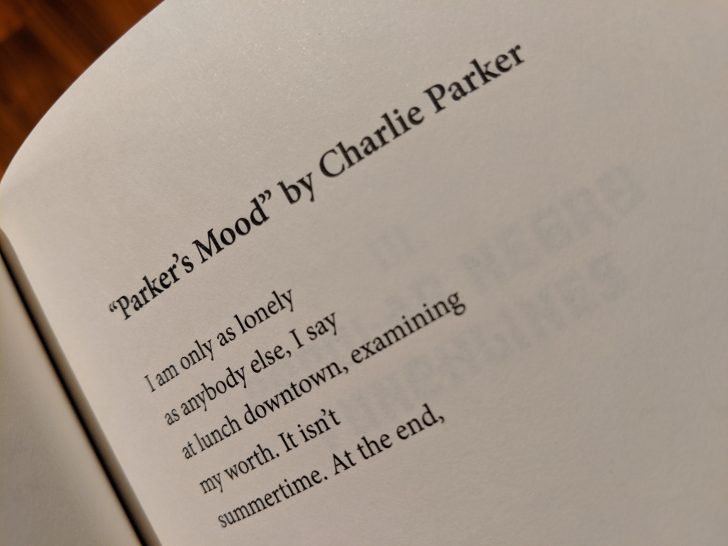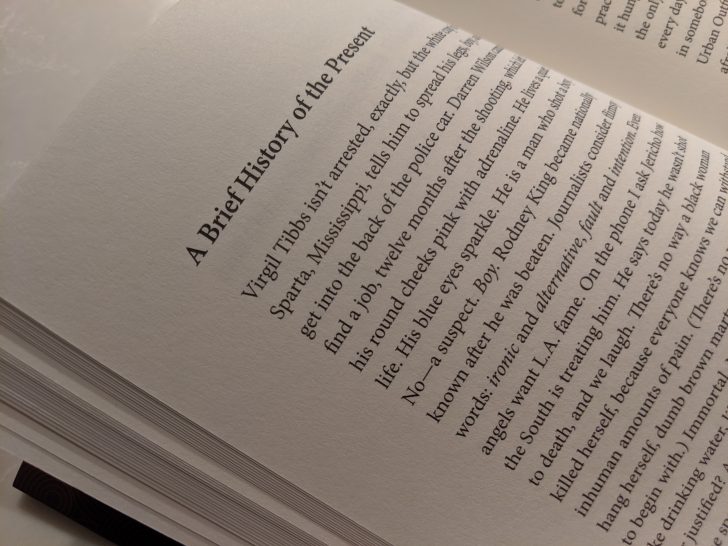In 2015, Morgan Parker published “if you are over staying woke” with Poetry magazine. I was taking a contemporary poetry seminar the summer of that year, and this was one of the poems in a stapled stack of her work we were assigned to discuss in two days. I ended up skipping class because I knew I couldn’t talk about “If you are over staying woke” without crying. The poem is a series of both serious and tongue-in-cheek suggestions about how to cope with the exhaustion of keeping current on terrible news—“Water/the plants,” “Floss. Take pills.”—punctuated by reminders that avoiding the news entirely is a hopeless cause. Parker says, in a brief interview accompanying the poem on PoetryFoundation.org, that this poem surfaced in her mind while she was writing about “the string of awareness” surrounding the deaths of Michael Brown and Eric Garner in 2014, and that the poem was her way of processing the communal grief that resulted from them.
I couldn’t know this grief as personally as she did. During protests where others were straddled facedown on the ground, I’ve been given stern warnings for my participation or been overlooked completely. In another instance, officers who had just pointed their guns at friends of mine for underage drinking gave me a simple talking to for the same activity. But the poem’s ending—just the word funeral, twice—resonated with me that summer. Two people from my hometown died of overdoses in quick succession that year, and a third passed away about a month before this writing. Toward the end of the interview, Parker says, “For me, unfortunately, that grief had come out of a place of being a black American and the consequences of racism, but I think it’s a poem that can be applied to coping with grief in any kind of way.”

Four years later, this poem has made its way into Parker’s latest book Magical Negro, from Tin House Books, no less relevant than it was before. According to The Washington Post, 16 unarmed people have been shot and killed by police so far this year, a disproportionate number of them people of color. Every day we see headlines about the struggle to hold pharmaceutical companies accountable for pushing opioids into the medical system. Many of the poems in Magical Negro share similar grief to “If you are overstaying woke,” but as always, Parker’s poetry is tempered with equal parts humor, anger, and celebration.
Much of Parker’s style remains consistent between this book and her last: a love of long titles, an immersive concern with pop culture, and a constant juggling of narrative, lyric, essay, and ode. But the scope of her work has changed. As the title of her last book, There Are More Beautiful Things Than Beyoncé, would suggest, for a long time Parker wrote obsessively about Beyoncé as a lens to explore black culture, white scrutiny, feminine performance, and other topics. The frame has since widened significantly. Rather than a single person, Magical Negro refers to a group—black characters in film and fiction who are employed only as special aides to white people. As a title, this serves to set a more pluralistic framework for this book, while performing a trick common among marginalized groups of taking a derogatory term and inverting its meaning. In this context, it says Why yes, thank you, we are magical, all by our own damn selves. If Beyoncé was a rejection of the idea that a single person should be seen as the be all and end-all of black womanhood, Magical Negro offers a more open-ended figure to take her place.
Though not as singular as Beyoncé, the magical negro trope retains Parker’s interest in mass media, exemplified by the title of the first section of the book: “LET US NOW PRAISE FAMOUS MAGICAL NEGROES.” The title is printed in an ornate typeface that seems like it’s been pulled from the title cards of old silent movies, which had more than their fair share of magical negroes. Among the book’s cast are Gladys Knight, Frederick Douglass, and Sammy Davis Jr., as well as common cliches like “the black body.” The interplay of names and types throws both in a new light. Take the following two passages, the first from “Magical Negro #217: Diana Ross Finishing a Rib in Alabama, 1990s”:
I don’t sleep with accolades I don’t get touched
in the night all men do is cry
and ask me to be their mama I can’t
get a decent fuck to save my
when I think about their feelings I don’t care
It’s cool it’s cool come to mama there is so much
death here she is casual and almost fragrant like
the word kill doesn’t sound as bad as it is
And then this one from “Magical Negro #3: The Strong Black Woman,” only two pages later:
That played-out scene she loves so much so she can feel like
she got a dick:
Angela Bassett at the end of the movie smoking
a cigarette, smug bitch burning
our cities down, cleavage always only a tease, with a face
like Can I help you.
Yes, bitch, you can. You can strip down to tears and dry cum.
You can be
more naked
You can’t read the second passage without reappraising the message of the first. What could have been read initially as a genuine role to follow becomes the subject of critique as Parker highlights the strictures that these common schemas of blackness impose. The limits can be especially strict for people with public careers whose success is built partly on conformity to stereotype and popularity with a largely white audience.

This tension between realness and fronting is nothing new. Writers as far back as Charles Chesnutt (1858-1932) have suffered great financial losses from choosing to create stories that aren’t palatable to white people. The current difference is that it is becoming less necessary for minoritized groups to submit to nationally dominant ideas of their culture. This can be largely attributed to centuries of struggle, and partially to cheaper recording and printing technology, as well as internet media platforms like Netflix, Spotify, and Amazon, whose business models allow smaller artistic markets to become more profitable than they are under their counterparts in cable, major label music, and major publishing houses. As Issa Rae broadens the possibilities for how black women are allowed to be seen with her shows Insecure and Awkward Black Girl, Parker is taking part in this broadening through poetry.
What is strangely missing from Magical Negro, in the midst of the famous people and stereotypes and challenges to stereotypes, is much emphasis on the not-so-famous. There isn’t a single person who hasn’t been televised or published referred to by name in the entire book. The closest thing to a person mentioned by name is a Matt in the poem “Matt.” Notably, Matt is a) white, and b) an amalgamation of people:
For all intents and purposes and because the rule applies
more often than it doesn’t, every white man or boy who
has entered and fallen away from my particular moderate
life has been called Matt. Not Dan. Rarely Ben. Never
Matthew. Matt smokes unfiltered Pall Malls because Kurt
Vonnegut did.
Why is this the case? Unfamous or unpublished black people are brought into the work almost exclusively through the word ‘we’ or through their familial relation to the narrator. If this is akin to Claudia Rankine’s explorations of how different nouns and pronouns function, Parker is nowhere near as explicit about it. It seems not just fitting, but necessary to bring readers’ attention to the lives (and deaths) of those who don’t have the buoys of money and popularity to keep them afloat in a country that profits handsomely from addiction and incarceration. Is Morgan Parker participating in the same culture-wide oversight she criticizes? This feels unlikely.
Are everyday people meant to be like the elephants in Conrad’s Heart of Darkness, made all the more conspicuous by their absence? Is it like in Hamlet, where the relative lack of women’s voices can be read as a commentary on the suppression of their voices? Is the use of only pronouns and relational nouns meant to create a sense of unity? Does she do this because she thinks we are already aware enough of the continuous death of loved ones, and wants to give us the relief that she strives for in “If you are over staying woke”? Or is the inclusion of more quotidian lives going to be the next curve in the arc of Parker’s writing? There are plenty of possible explanations, but I can’t settle on one. In any case, Magical Negro is more than enough to keep a soul fed for quite some time.
